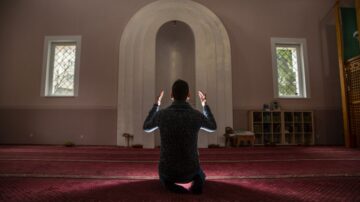In continuing with the noble traits of the true servants of The Merciful, we find that they are characterized by a deep sincerity; they give up their precious sleep time in devotion to their Most Gracious Creator.
The Most High elucidates the next quality of His servants who are,
“Those who spend part of the night prostrating and standing in devotion to their Lord.” (Al-Furqan, 25:64)
Praying in the night reflects a special relationship with God. It is a distinguishing characteristic of those who are in an elevated state of faith. Almighty God asks us in another verse,
“Is the one who is devoutly obedient during periods of the night, prostrating and standing in prayer, fearing the hereafter and hoping for the mercy of His Lord, (like the one who does not)? Say, ‘Are those who know equal to those who do not know?’ Only they will remember who are people of understanding.” (Az-Zummar, 39:9)
In fact, many Muslims often pray the recommended prayers during the day, yet rarely pray the night prayer. Of course it is good that they pray these prayers, but according to the Prophet (peace be upon him) there is a mistaken set of priorities. He said, “The best prayer after the obligatory prayers is the night prayer.” (Muslim)
We should take this blessed opportunity in Ramadan to build this closeness with Allah. Starting with the Taraweeh (night prayers in Ramadan) prayers, we get accustomed to praying in the early night. Although that has a great reward and the Prophet (peace be upon him) said, “Whoever prays the nights of Ramadan will have his previous minor sins forgiven” (Bukhari), the real reward and much deeper act of faith and obedience is in praying the last third of the night. The Prophet (peace be upon him) said, “God descends (in a way that suits His Sublimity) in the last third of the night. He then says, ‘Who will supplicate me so I can answer him? Who will ask Me so I can give him? Who will seek my forgiveness so I can forgive him?’” (Bukhari)
No doubt, praying during the night has a huge reward in the Hereafter, but it is also a major deterrent to a sinful lifestyle. It softens our hearts, helps us remember the glorious Qur’an, and most importantly it brings us closer to God. We should all take this opportunity in Ramadan to get up at least an hour before Fajr to pray. Let’s start by simply praying 4 rakahs of tahajjud prayer, and witr (which may be prayed in any odd number of rakahs). Then, in the last ten nights, let’s make itikaaf (seclusion) in the Mosque. If that’s not possible, then continue with the 4 rakahs.
Further more, someone might have not memorized much of the Qur’an and they may be concerned that they don’t have much to read. In that case you may suffice with al-Fatihah as it is just a Sunnah to read another surah. If you have memorized something, you may read what you know in each rakah. For those who can read the Qur’an in Arabic, there is a facilitation in the practice of the companions in that you may pray while holding the Qur’an and read directly from it. It has been authenticated that Aishah (may Allah be pleased with her) ordered her servant to lead her in taraweeh while he was reading from the Qur’an. (Bukhari)
After Ramadan, let’s continue to do this even if it is just waking up 15 minutes earlier so that we can pray two rakahs of witr. The Prophet (peace be upon him) taught us to make witr the last prayer of the night before Fajr and that we should not pray witr twice in one night. He (peace be upon him) also said, “The best deeds are those we are consistent with, even if they are small deeds.” (Bukari)
For those of us who are having problems with focus and concentration in our prayers, I advise you to read this series.
May Allah make praying in the nights easy for us and may He count us among His servants!
By Yahya Ederer (Abu Majeed)

